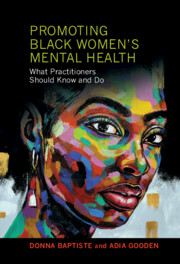Book contents
- Promoting Black Women’s Mental Health
- Promoting Black Women’s Mental Health
- Copyright page
- Contents
- Figures
- Tables
- Contributors
- Introduction
- Part I Black Women in Context
- Part II Therapy Contexts
- Part III Core Themes in Black Women’s Stress and Distress
- 8 Strong Black Woman Persona: Mental Health Impacts
- 9 Shifting in Black Women: Clinical Implications
- 10 Black Women’s Mothering and Caregiving
- 11 Black Women’s Romantic and Intimate Relationships
- 12 Appearance Prejudice and Discrimination against Black Women
- Part IV Helping Black Women Recover and Thrive
- Appendix
- Index
- References
8 - Strong Black Woman Persona: Mental Health Impacts
from Part III - Core Themes in Black Women’s Stress and Distress
Published online by Cambridge University Press: 22 June 2023
- Promoting Black Women’s Mental Health
- Promoting Black Women’s Mental Health
- Copyright page
- Contents
- Figures
- Tables
- Contributors
- Introduction
- Part I Black Women in Context
- Part II Therapy Contexts
- Part III Core Themes in Black Women’s Stress and Distress
- 8 Strong Black Woman Persona: Mental Health Impacts
- 9 Shifting in Black Women: Clinical Implications
- 10 Black Women’s Mothering and Caregiving
- 11 Black Women’s Romantic and Intimate Relationships
- 12 Appearance Prejudice and Discrimination against Black Women
- Part IV Helping Black Women Recover and Thrive
- Appendix
- Index
- References
Summary
Strong Black Woman Persona: Mental Health Impacts, discusses the everyday experience of Black women’s penchant to be overcommitted and overburdened in caring for the needs of others. This idea, framed as the Strong Black Woman persona, is a racialized gender performance, a scripted role into which Black women are socialized, beginning in childhood. We discuss the historical, societal, and cultural forces that cause women to internalize Strong Black Woman identities. We also recommend strategies to help Black women move beyond a sense of constant self-sacrifice to prioritizing self-care.
- Type
- Chapter
- Information
- Promoting Black Women's Mental HealthWhat Practitioners Should Know and Do, pp. 191 - 213Publisher: Cambridge University PressPrint publication year: 2023

